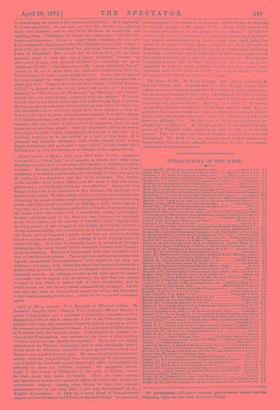Life of Henry Digester. First President of Harvard College. By
Jeremiah Chaplin, D.D. (Boston, U.S.: Osgood.)—Henry Dunster, a native of Lancashire and a graduate of Cambridge, emigrated to Now England in 1640, to which place not a few of his Unversity contem- poraries had come, and assisted to found by gifts of property as well as by personal exertions Harvard College. For some time he filled the post of President with the highest repute. Unfortunately he became con- vinced that Psedohaptism was contrary to the word of God, and that "risible believers only should be baptised." Thsre was not enough toleration in the Puritan community—and in what community, indeed, would there be toleration enough ?—to put up with this heresy, and Dunstor was expelled from his post. He was even obliged to leave the colony, where he was prohibitsd from exercising any liberal profession, and in which he was liable to, and indeed did, suffer civil penalties for refusing to have his children baptised. Ile emigrated accord- ingly to the colony of Plymouth, to the torn of Scituate, where he died about five years afterwards. There are some curious and interesting notices of academical affairs at Cambridge during the seventeenth century. Among other things, we find that corporal punishment was in use long after it had been discontinued in the English Universities. In 1654 the General Court of Massachusetts To ADVENT1869.8.—To insure insertion, Advertisements should reach the empowered the President and Fellows of Harvard College "to punish all Publishing Office not later than 12 a.m. on Friday.
misdemeanours of the youth in their society, either by fine, or whipping in the hall, openly, as the nature of the offence shall require, not
exceeding ten shillings, or ten stripes for one offence." In 1734 the revised code of laws empowered the president, tutors, and professors "to punish undergraduates by boxing, when they shall judge the nature or circumstance of the offence to call for it." It is curious to see Dunster's biographer speaking of the system of " fellowships" as having been long a part of the system of the English Universities, and a thing that ought to be introduced into the American Colleges. Hera we are beginning to think that we have outgrown it. We notice one or two
misprints in matters where misprints should not ; " pudot haec opprobria nobis et dici potuisse refelli" and " schola illustra " should not appear in the life of a president of a college.


































 Previous page
Previous page